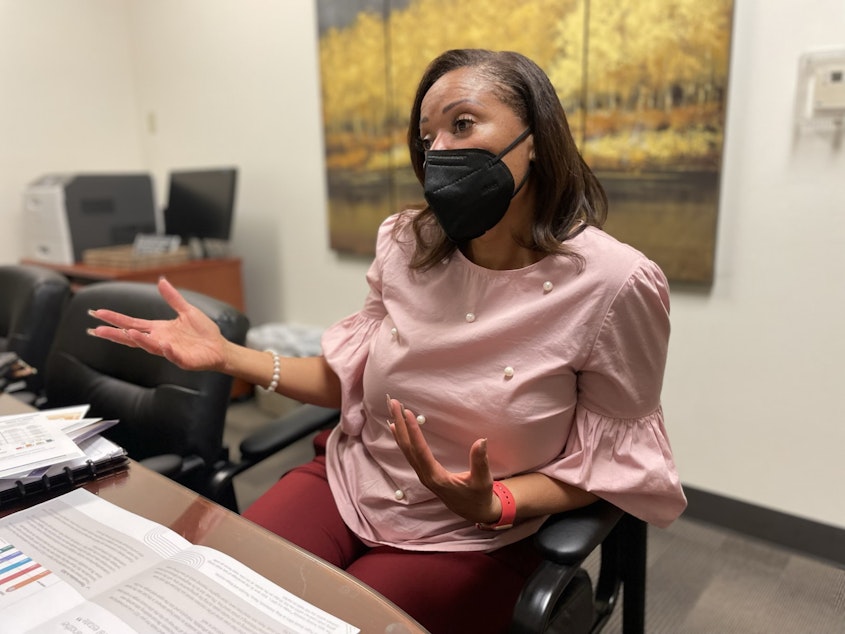This realtor wants to find you a house in Washington. The odds are stacked against her.

The housing market is tight across Washington state. There’s very little out there for people to buy, and that’s driving home prices out of reach for many of the people who live in the region.
The problem has hit Black, Indigenous and families of color hardest, and contributed to the segregation of neighborhoods.
Now, lawmakers in Olympia are trying to relax zoning rules so affordable housing is more accessible.
In Renton, real estate broker Rache' Boston sits down with a client who’s looking for a home in the $500,000 to $700,000 range.
But there’s a problem — there are hardly any homes like that available.
“We’re at an extreme shortage," Boston explains. "That means all of those homes that come on the market ... will sell for over list price. What we’ve starting to see is that the houses that in 2016 ... cost $400,000, that same exact house now is $700,000.”
Boston says because there are so few homes in that so-called “missing middle” price range homes that should be priced lower are being snapped up at those higher prices.
RELATED: 'Forbidden houses of Bothell' show how multifamily housing fits into single-family zones
Sponsored
And so, people find themselves compromising, or going after more expensive homes that require bigger loans than maybe they’d planned on.
Before Boston was a real estate agent, she worked at a bank and saw how hard those loans are to get.
“I was a loan officer there," Boston says. "I turned down everybody that was Black and brown that came into that bank to get a home loan, because if you didn’t fit under this one umbrella that the bank had for a home loan then you were denied. And I said I’ve gotta do something about this, I’ve got to educate."
Boston taught classes at the Urban League on how to become a first time home buyer. And now, she tells clients at her real estate firm how to hold on to hope. But there’s only so much she can do, if there aren’t homes available at a reasonable price.
The missing middle
Right now, in Olympia, lawmakers are trying to create more "missing middle" housing.
The idea is that cities have a lot of land reserved for single family zones, where you can only build one house on a piece of property. Lawmakers want cities to open up, or “upzone” that land to allow for duplexes, triplexes, fourplexes and in some cases, six-unit apartment buildings. The idea is to bring down the price of a new home.
Patience Malaba is with the Housing Development Consortium of Seattle-King County, one of the many groups supporting the bill.
“Middle housing is inherently less expensive than a standalone house," she says. "Largely because it’s smaller and the cost of land for it is kind of split between a few households.”
Malaba says bans on this kind of housing means that families have to bear the high cost of land ownership alone. They may have to qualify for a bigger loan. And combined with Boston's story about denying loan applicants, it's easy to see how this pattern can lead to segregated neighborhoods.
Sponsored
Ways to make it work
But not everyone agrees that dividing up the cost of land among multiple families automatically means housing will become more affordable.
Paul Schissler is a critic of the legislation. He says if the goal of the bill is to create more affordable housing, that should be stated explicitly.
“If people aimed for that, we’d find ways to do it."
In his job, Schissler works with small communities to make sure the homes they build remain affordable forever. He uses a tool called a “community land trust.”
Sponsored
From that work, he draws a lesson: When governments upzone land, they create value out of thin air. It’s like printing money.
But in this case, the land is suddenly more valuable for the people that own it. It’s like a gift. Governments can use the value of that gift as leverage to get something they want, in this case, affordable housing.
“If we’re going to change what’s allowed, I think we should change what’s allowed and get what we really need,” he says.
The City of Seattle has done something like this before, when it created its "mandatory housing affordability" program. The city told developers: "OK, you can now build taller buildings on this land. But in exchange, you have to contribute to affordable housing every time you build something new."
The program has quietly generated almost $100 million for affordable housing so far.
It’s not the perfect solution for home ownership though.
Because all the money went to rental housing, rather than creating homes people can buy.
But it’s an example of how governments can use an upzone, as leverage.
As for the bill in Olympia, government analysts say it could create anywhere between 30,000 and 100,000 new homes in the next 30 years.




